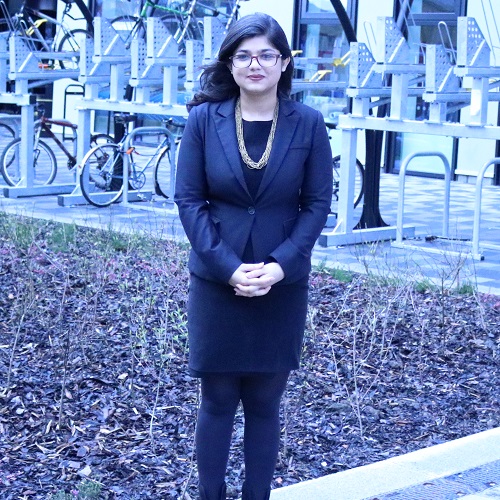LLM/MSc/PgDip/PgCert Criminal Justice & Penal Change
ApplyKey facts
- Start date: September
- Study mode and duration: LLM/MSc: 12 months full-time, 24 months part-time
PgDip: 9 months full-time, 21 months part-time Scholarships: EU Engagement Scholarships worth £10,000 available to applicants from EU countries
Study with us
- draw on a range of disciplinary and the latest international approaches, to develop a rational and just response to crime
- full-time, part-time and evening study options
- learn from world-leading experts in the fields of policy and practice
- examine a range of legal, political and social responses across the world to what is widely known as the 'penal crisis'
- you can choose to do a 60-credit enhanced research proposal, professional internship or a professional project instead of a traditional dissertation.
I enjoyed the class mix as we had lawyers, practitioners, recent graduates and also international students which brought different ideas and experiences which made debates exciting and interesting.
Karen Fullerton, MSc Criminal Justice and Penal Change
The Place of Useful Learning
UK University of the Year
Daily Mail University of the Year Awards 2026
Scottish University of the Year
The Sunday Times' Good University Guide 2026
Why this course?
Blending a rigorous understanding of fundamental theory with evidence about real world problems you’ll analyse recent innovations in theory, policy and practice.
Drawing on a range of disciplinary approaches, the course will enable you to develop a rational and just response to crime.
The LLM/MSc in Criminal Justice & Penal Change is unique in both its approach and its flexibility.
Key features:
- our focus is on pressing contemporary national and international issues of policy and practice
- choose to graduate with either an LLM or MSc
- study full-time or part-time
- learn from a world-class teaching team
- students are from a range of nationalities and disciplinary backgrounds
Course video
Hear from Professor Cyrus Tata and students on the course.

Who is the course suitable for?
- practitioners working in a wide range of law, justice and welfare areas
- professionals developing justice policy
- members of the third /voluntary sector
- recent graduates in law, social sciences and humanities
Flexible study options
You can choose to graduate with an LLM or MSc or complete the course early with a Postgraduate Diploma/Certificate.
You'll have the option of studying full-time or part-time and attending classes in the early evening.
Meet Our Experts
Your learning will be developed by some of the world’s foremost experts – not only in academic research but also in the fields of policy and practice.
The teaching and supervision team includes:
| Name | Areas of Expertise |
|---|---|
| Dr Dominic Aitken | Criminal Law, History and Politics of Criminal Justice, Prison Regimes |
| Prof Tim Chapman | Restorative Justice; Youth Justice; Probation; Community Sanctions; Victims |
| Dr Adam Harkens | Policing; Algorithmic Decision-Making Tools; Artificial Intelligence |
| Prof Nancy Loucks | Comparative Prison Policy; Women & Criminal Justice; Families & Justice; Homicide |
| Dr Michelle Donnelly | Youth Justice; Child Protection; Children's Rights |
| Dr Jamie MacLean | International Criminal Justice; Miscarriages of Justice; Transitional Justice |
| Dr Miroslaw Sadowski | Criminal Law, Childhood & Crime, Human Rights |
| Prof Jane Scoular | Gender & Legal Theory; Sexwork; Gender & Crime; Domestic Violence |
| Prof Cyrus Tata | Sentencing & Penal Decision-Making; Access to Justice; Law & Emotions; Public Confidence in Criminal Justice (Course Director) |
| Dr Rhonda Wheate | Criminal Law; Evidence; Expert Evidence; Forensic Science, Homicide; Juries |

I thoroughly enjoyed meeting and building close friendships with international students from Saudi Arabia, Africa, Pakistan and Germany. The diversity of knowledge and experience between the students made discussions and debates incredibly enriching and invaluable. Being cooked international food by fellow students was an added bonus!
Law Postgraduate Community Bursary
The Faculty of Humanities & Social Sciences is offering a £700 fee reduction for ten applicants to the LLM Criminal Justice & Penal Change, LLM Human Rights Law and LLM Mediation & Conflict Resolution degree programmes who are working at any third sector/NGO organisation in the field of criminal justice and penal change, human rights or conflict resolution.
Our students

Sanghmitra Singh
India
I love it when law and social sciences interact, and this course has delivered exactly that. The reading lists are extensive, relevant and interesting. However, the quality of professors and lecturers in this particular course steal the show for me. I feel extremely lucky to be under the guidance of such brilliant, extraordinary and encouraging academicians.

Karen Fullerton
Scotland
The highlight of my year at Strathclyde was meeting like-minded people who were also passionate about the justice system. I enjoyed the class mix as we had some lawyers, practitioners, recent graduates and also international students which brought a mix of ideas and experiences.

Tania Nascimento
Portugal
The LLM in Criminal Justice and Penal Change helped me explore my interests further. I was pleasantly surprised that the course covered such a range of topics, including Criminal Justice & Penal Decision-Making, Childhood & Crime, Surveillance, Technology & Control, and Restorative Justice.

Kirsten Thornton
Scotland
I felt so supported during my time at Strathclyde, particularly by the course moderator and my dissertation supervisor. I continued to work full time while undertaking the course full time so I think I possibly relied on support from the university more than many. While the support and flexibility from my boss was hugely valuable, the guidance and understanding from the university was a lifeline.

The Masters was deeply rewarding. The diversity of students enriched our class discussions, while trips to prisons and problem-solving courts offered invaluable real-world insight. All of this was supported by stimulating teaching and fascinating course content.
Interested in postgraduate study?
At the Faculty of Humanities and Social Sciences, our friendly and knowledgeable team will be available to provide you with all the information you need to kick-start your postgraduate journey at the University of Strathclyde. Register for upcoming events below:
Course content
The LLM/MSc in Criminal Justice and Penal Change provides scope for flexibility within an overall framework.
In addition to the list of core and elective classes, you may also be able to take options from a range of postgraduate courses including:
Justice & Penal Decision-Making
In this module we examine the moral and empirical bases of decision-making around the globe. How are traditional theories of justice being challenged, and what are the alternatives? In the light of the international evidence, is it time for a re-think? Illustrative topics include:
- legitimacy
- discretion
- rehabilitation & desistance
- restorative justice
- public attitudes to and knowledge of criminal justice
- the trial
- access to justice
- prosecution & defence
- sentencing
- parole
- release from prison
- community sentences
- human dignity
- participation
- rights
- therapeutic jurisprudence
- criminal procedure
- predictive justice
- equality
- reform & democratisation
Learning is conducted through a range of methods including student-led debates, role plays, scenarios and simulations. The module is accompanied by visits to key institutions, including courts, prisons, new Third Sector projects, innovations such as the Drug Court as well as conferences with key practitioners and policy makers.
Punishment & Processes of Penal Change
The western world’s “penal crisis” has, over the past thirty years, posed specific challenges to the reform tradition.
In this module we explore the nature, dimensions and national permutations of that crisis, putative solutions to it and likely obstacles to their realisation. We draw on theoretical developments in the study of justice and punishment and explore their potential to illuminate and inform processes of progressive penal change.
The module examines contemporary changes, international evidence and policy transfer, and technological challenges and considers reform across the globe. The module draws on insights and perspectives including law, the sociology of punishment, history and the social sciences
Learning is conducted through a range of innovative methods such as debates and media representations. The module is supplemented by visits to key institutions' prisons, women’s justice centres, as well as conferences with key practitioners and policy makers.
Dissertation
Your Master’s will culminate in a dissertation. This is an extended project of enquiry into an area of your own choice. You'll create knowledge in answer to a question which really intrigues you.
While you'll be very much in the driving seat, your work is nurtured and guided by a member of our academic staff team. You'll be guided by some of the world’s foremost experts.
Or
Enhanced Research Proposal
60 credits
This module supports students writing an enhanced research proposal, with a view to supporting their transition into PGR study (PhD/MPhil studies) and creating an early research supervision relationship with a prospective supervisor.
Or
Professional Internship
60 credits
This module gives students the opportunity to apply to pursue an internship in a national or international organisation relevant to their course. The internship allows students to be placed in a relevant host organisation for a specified number of hours agreed with the Strathclyde tutor. The student will be responsible for producing an internship report which will include an account of the knowledge and skills attained applying theoretical concepts and with reference to discipline specific literature as well as an in-context self-reflective analysis of the experience, the organisation and the work undertaken enabling broader critical reflections on the student’s place in the professional world.
Please note that enrolment in the Professional Project and Professional Internship modules is by application and is not guaranteed.
Or
Professional Project
60 credits
This module gives students to apply to do independent work in the final semester of their LLM/MSc. Students will be required to identify and co-design the project supported by their Strathclyde mentor. The project report includes the response to the research question co-designed with a relevant host organisation as well as an in-context self-reflective analysis of the project, the organisation and the student’s experience in executing the work enabling broader critical reflections on the student’s place in the professional world.
Choose from a range of advanced option modules including:
Restorative Justice
Restorative justice as applied to criminal harms, has grown and spread rapidly across the world in the last twenty years or so. Research indicates that in comparison with formal or retributive justice there can be more positive outcomes for both offender and victims. Yet the adoption of restorative justice within or alongside criminal justice systems has been patchy.
Experience has shown that restorative justice is a popular topic and this module provides an opportunity for advanced learning. Your learning will be accompanied by practical exercises, such as simulations led by leading practitioners.
Childhood & Crime
Youth justice attracts interest across society, politically, socially and legally. Some issues – from the murder of two year old James Bulger in 1993 by two 10 year old children to the riots in 2011 in England – spark moral panic and demonstrate the extent to which such matters cut across disciplinary boundaries and influence legal and societal responses to children who offend.
Youth justice generates its own philosophical approaches eg in the welfare / justice debate. It also provides a context within which to examine broader issues affecting criminal justice as a whole such as the need to balance the rights of the accused against the public interest.
This class will provide an opportunity for you to critically examine some key aspects of youth justice law, policy and philosophy from a number of perspectives. Your learning will be supplemented by visits to custodial and innovative community settings, as well as a visit to and a simulation of Scotland’s unique system of ‘Children’s Hearings’ (a decision-making system based on the best needs of the child).
Homicide
This module examines the legal, historical and social science perspectives on homicide.
As well as legal-philosophical scrutiny of key issues in criminal law and procedure, technology and homicide, you'll also gain the latest evidence on homicide.
International Criminal Justice
Recent years have witnessed major developments in international criminal justice, with the establishment of not only of ad hoc but also hybrid international criminal tribunals and, ultimately, the permanent International Criminal Court.
The International Criminal Justice module provides you with an opportunity to develop a deep, critical awareness of those various legal, social, and political strategies, mechanisms, and institutions that have been developed to deal with crimes with an international or trans-national dimension and of the new challenges that are emerging across the contemporary world. You'll engage critically with the philosophy and history of international criminal justice, as well as the legal frameworks, enforcement mechanisms, and contemporary developments in the arena of the prosecution of international crimes (genocide, war crimes, crimes against humanity, aggression, and torture). There's a particular focus on the role of courts and tribunals and the key issues, debates, and challenges facing the implementation of these kinds of prosecutions, including the possibility of alternative forms of response.
Offender Supervision & Management
Offender Supervision & Management module enables you to gain the necessary knowledge, understanding and skills to critically engage with theory, research and contemporary debates about the management of offenders. You will be able to apply this knowledge to professional and practice contexts. With ‘real-world’ policy and practice kept front of mind, key issues include:
- rationales and contexts of offender supervision and management
- repairing harm and community payback
- effective practice and practising effectively: models for offender supervision & management
- ‘high-risk’ offenders (such as sex offenders): evidence and ethics
- understanding and supporting desistance
- offender perspectives and user voices: narratives of crime, punishment and desistance.
- managing Risk, compliance and cooperation: lessons from multi-agency public protections arrangements
- supervising of young people
- restoration & justice
- change or control
Surveillance, Technology & Crime Control
Contemporary societies are witnessing an explosion in the use of new technologies to carry out surveillance of their citizens in the attempt to manage and prevent crime. This raises a whole range of new ethical, legal and politically dilemmas. It examines the evidence about the effectiveness of such new technologies as well as their risks, and invites you to think about effective means of regulation. The module is illustrated by contemporary examples from around the world and opportunities to visit public and private agencies using technologies to carry out surveillance.
Key issues include:
- theorising surveillance and explanations of the emergence of ‘the surveillance society’
- privacy issues and crime control debates: evidence and ethics
- policing, CCTV and its permutations - policy and research on this widespread innovation in policing
- databases, digital identities and criminal justice - the relevance of databases for the mangement of offenders, especially sexual and violent offenders
- the electronic monitoring of offenders - the use of RF and GPS technologies in offender supervision, the crossover between surveillance and techno-corrections
- technocorrections and crime control - the technological augmentation of traditional forms of crime control, from drug testing to tasers, and how that illuminates essentialist and constructivist debates about the trajectory of technological forms, how far technology displaces humanistic interventions
- intelligence, terrorism and surveillance - the emergent "war on terror" and the globalisation of eavesdropping
- critiquing, resisting and regulating surveillance
- representations of surveillance and crime control technologies
Learning & teaching
As well as seminars, you’ll be asked to take part in role-play exercises, presentations and other forms of learning.
We have an active programme of public lectures from eminent visiting speakers on contemporary topics. There'll be a programme of visits to local justice agencies designed to stimulate your academic learning.
Course Overview
Find out more from our students.
Entry requirements
| Academic requirements | First-class or Second-class Honours degree, or international equivalent, in Law, one of the social sciences, business or humanities. Entry may be possible with other qualifications and/or experience. |
|---|---|
| English language requirements | Please check our English requirements before making your application. |
Pre-Masters preparation course
The Pre-Masters Programme is a preparation course held at the University of Strathclyde International Study Centre, for international students (non-UK/Ireland) who do not meet the academic entry requirements for a Masters degree at University of Strathclyde.
Upon successful completion, you'll be able to progress to this degree course at the University of Strathclyde.
Chat to a student ambassador
If you want to know more about what it’s like to be a Humanities & Social Sciences student at the University of Strathclyde, a selection of our current students are here to help!
Our Unibuddy ambassadors can answer all the questions you might have about courses and studying at Strathclyde, along with offering insight into their experiences of life in Glasgow and Scotland.
International students
We've a thriving international community with students coming here to study from over 140 countries across the world. Find out all you need to know about studying in Glasgow at Strathclyde and hear from students about their experiences.

Fees & funding
All fees quoted are for full-time courses and per academic year unless stated otherwise.
Fees may be subject to updates to maintain accuracy. Tuition fees will be notified in your offer letter.
All fees are in £ sterling, unless otherwise stated, and may be subject to revision.
Annual revision of fees
Students on programmes of study of more than one year (or studying standalone modules) should be aware that the majority of fees will increase annually.
The University will take a range of factors into account, including, but not limited to, UK inflation, changes in delivery costs and changes in Scottish and/or UK Government funding. Changes in fees will be published on the University website in October each year for the following year of study and any annual increase will be capped at a maximum of 10% per year. This cap will apply to fees from 2026/27 onwards, which will not increase by more than 10% from the previous year for continuing students.
| Republic of Ireland |
If you are an Irish citizen and have been ordinary resident in the Republic of Ireland for the three years prior to the relevant date, and will be coming to Scotland for Educational purposes only, you will meet the criteria of England, Wales & Northern Ireland fee status. For more information and advice on tuition fee status, you can visit the UKCISA - International student advice and guidance - Scotland: fee status webpage. Find out more about the University of Strathclyde's fee assessments process. |
|---|---|
| Scotland, England, Wales & Northern Ireland | LLM/MSc:
PgDip:
PgCert: £4,167 *Please note, Year 2 fee will be subject to an increase |
| International | LLM/MSc: £26,000 PgDip: £17,333 PgCert: £8,667 |
| Available scholarships | Take a look at our scholarships search for funding opportunities. |
| Additional costs | No additional costs for law modules and all compulsory material is in the library. International students may have associated visa and immigration costs. Please see student visa guidance for more information. |
Please note: the fees shown are annual and may be subject to an increase each year. Find out more about fees.
How can I fund my course?
Scottish postgraduate students
Scottish postgraduate students may be able to apply for support from the Student Awards Agency Scotland (SAAS). The support is in the form of a tuition fee loan and for eligible students, a living cost loan. Find out more about the support and how to apply.
Don’t forget to check our scholarship search for more help with fees and funding.
Students coming from England
Students ordinarily resident in England may be to apply for postgraduate support from Student Finance England. The support is a loan of up to £10,280 which can be used for both tuition fees and living costs. Find out more about the support and how to apply.
Don’t forget to check our scholarship search for more help with fees and funding.
Students coming from Wales
Students ordinarily resident in Wales may be to apply for postgraduate support from Student Finance Wales. The support is a loan of up to £10,280 which can be used for both tuition fees and living costs. Find out more about the support and how to apply.
Don’t forget to check our scholarship search for more help with fees and funding.
Students coming from Northern Ireland
Postgraduate students who are ordinarily resident in Northern Ireland may be able to apply for support from Student Finance Northern Ireland. The support is a tuition fee loan of up to £5,500. Find out more about the support and how to apply.
Don’t forget to check our scholarship search for more help with fees and funding.
International students
We've a large range of scholarships available to help you fund your studies. Check our scholarship search for more help with fees and funding.
Faculty of Humanities & Social Sciences Scholarships
EU Engagement Scholarships are available to EU applicants who would have previously been eligible for Home (Scottish/EU) fee status.
Careers
Students on the Strathclyde Masters (LLM or MSc) in Criminal Justice and Penal Change come from a range of backgrounds.
Some are recent graduates in law, humanities and the social sciences from around the world. Many are current practitioners, policy-makers in different fields of criminal justice. They find the course of invaluable assistance in gaining a step up the career ladder.
Where are they now?
Occupations which criminal justice students may (and do) take up include:
- Advocacy
- Central Government Criminal Justice Research Manager
- Council of Europe Analyst
- Criminal Barrister
- Defence law
- European Union Policy Analyst
- Forensic Services
- Judiciary
- Local Government Criminal Justice Policy Manager
- Lecturer in Criminal Justice
- Parliamentary Advisors on Criminal Justice
- Prosecution Service
- Prison Management
- Prison Psychologist
- Prison-based Social Work
- Victim Support
What do employers say?
I’m pleased to endorse this exciting and well thought through new course. It’s encouraging to see for the first time the direct, upfront link between Criminal Justice and Penal Change. One area in particular I welcome is the practical focus on risk assessment, defensible decision making, multi-agency partnership working and effectiveness of interventions to address offending behaviour."
D E Gunn O.B.E. M.A. M.Soc.Sc. MSc, has been Governor of HM Prisons Greenock, Polmont YOI, Edinburgh and Glenochil and is Director of Operations for the Scottish Prison Service
I welcome this course at a time when investment in community supervision is being cut, prisoner numbers are rising, and the Service is threatened with privatisation. Its focus on desistance and restorative justice is central to the maintenance of an ethically sound approach to interventions. In turn its emphasis on prison reform by encouraging more therapeutic approaches for those in custody is an essential way to ensure community and prison-based interventions are both complementary and successful.”
Jonathan Ledger, General Secretary of the National Association of Probation Officers, UK
Glasgow is Scotland's biggest & most cosmopolitan city
Our campus is based right in the very heart of Glasgow. We're in the city centre, next to the Merchant City, both of which are great locations for sightseeing, shopping and socialising alongside your studies.
Apply
Start date: Sep 2026
Criminal Justice and Penal Change
Start date: Sep 2026
Criminal Justice and Penal Change
Start date: Sep 2026
Criminal Justice and Penal Change
Start date: Sep 2026
Criminal Justice and Penal Change
Start date: Sep 2026
Criminal Justice and Penal Change
Start date: Sep 2026
Criminal Justice and Penal Change
Start date: Sep 2026
Criminal Justice and Penal Change
Contact us
Prospective student enquiries
Contact a member of our team on LiveChat between 10am and 4pm (GMT)
Telephone: +44 (0) 141 444 8600
Have you considered?
We've a range of postgraduate taught and Masters courses similar to this one which may also be of interest.

